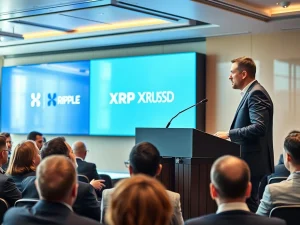Empowering Bitcoin: Tether and OCEAN Mining Pool Join Forces to Decentralize Block-Building

In a powerful move towards bolstering Bitcoin’s core tenet of decentralization, stablecoin giant Tether has announced a groundbreaking partnership with OCEAN mining pool. This collaboration is set to inject a significant dose of decentralization into Bitcoin’s block-building process, an area currently dominated by a few major players. Let’s dive into how this strategic alliance aims to reshape the landscape of Bitcoin mining and empower a more distributed network.
Why is Bitcoin Decentralization at Risk from Centralized Block-Building?
While Bitcoin’s hashrate—the computational power securing the network—is geographically distributed across numerous miners, a critical aspect, known as block-building, has become increasingly centralized. Block-building is the process where mining pools select and order transactions to be included in the next block added to the Bitcoin blockchain. Currently, a handful of large mining pools, such as Foundry USA, AntPool, and ViaBTC, control a significant portion of this block-building activity. This centralization poses several potential risks:
- Censorship Vulnerability: Centralized pools could be pressured or compelled to censor certain types of transactions, undermining Bitcoin’s censorship resistance.
- Single Points of Failure: Over-reliance on a few entities creates single points of failure, making the network more vulnerable to attacks or manipulation.
- Reduced Miner Autonomy: Miners become dependent on these centralized pools, diminishing their individual control and influence over the network.
Recognizing these challenges, Tether and OCEAN are stepping in to champion a more decentralized approach.
OCEAN Mining Pool: Pioneering Decentralized Block-Building with DATUM
Enter OCEAN mining pool, a relatively new player founded by Bitcoin core developer Luke Dashjr. OCEAN’s mission is to decentralize block-building through its innovative DATUM protocol. DATUM is open-source software that empowers individual miners to construct their own block templates. This groundbreaking approach offers several key advantages:
- Miner Empowerment: DATUM allows miners to independently generate block templates, reducing their reliance on centralized pool operators.
- Enhanced Censorship Resistance: By enabling miners to build their own blocks, DATUM makes it significantly harder for any single entity to censor transactions.
- Geographic and Operational Diversity: DATUM’s low-latency performance ensures global competitiveness, promoting a more geographically diverse and resilient Bitcoin network.
OCEAN’s commitment to open-source technology and miner autonomy aligns perfectly with the core principles of Bitcoin, making it an ideal partner for Tether’s decentralization initiative.
Tether’s Strategic Move: Deploying Hashrate to OCEAN for Bitcoin Decentralization
Stablecoin issuer Tether is making a bold statement by committing to direct its existing and future Bitcoin hashrate to OCEAN mining pool. This isn’t just a symbolic gesture; Tether is a significant player in the Bitcoin mining space, having announced a substantial $500 million investment in late 2023. Currently, Tether operates Bitcoin mining sites in Uruguay, Paraguay, and El Salvador, further cementing its commitment to the ecosystem.
According to Paolo Ardoino, CEO of Tether, this move is deeply rooted in their mission to “fortify Bitcoin against centralizing forces.” By leveraging OCEAN’s DATUM software across its global mining operations, including in regions like rural Africa, Tether aims to:
- Boost OCEAN’s Hashrate: Tether’s substantial hashrate will provide a significant boost to OCEAN, helping it gain market share and challenge the dominance of existing centralized pools.
- Promote DATUM Adoption: Tether’s adoption of DATUM will serve as a powerful endorsement, encouraging other miners to explore and implement this decentralized block-building solution.
- Strengthen Bitcoin’s Resilience: Ultimately, this partnership contributes to a more robust and censorship-resistant Bitcoin network, benefiting the entire ecosystem.
Bitcoin Mining Landscape: OCEAN’s Uphill Battle and Tether’s Potential Impact
Currently, OCEAN mining pool is still a relatively small player, mining between 0.2% and 1% of Bitcoin blocks. In comparison, industry giants like Foundry USA, AntPool, and ViaBTC command a significantly larger share, collectively accounting for over 66% of all blocks mined recently.
However, Tether’s partnership has the potential to be a game-changer. Bitcoin mining statistics show that OCEAN’s hashrate has been around 18.3 exahashes per second (EH/s), while Foundry USA boasts over 298 EH/s. By directing its hashrate to OCEAN, Tether could substantially increase OCEAN’s output and market share, creating a more competitive and decentralized mining landscape.
The Future of Block-Building: Empowering a Decentralized Bitcoin
The collaboration between Tether and OCEAN mining pool represents a significant step forward in the ongoing quest for a truly decentralized Bitcoin. By championing decentralized block-building, this partnership aims to:
- Enhance Network Security: A more decentralized block-building process reduces the risk of manipulation and censorship, strengthening Bitcoin’s overall security.
- Foster Innovation: Decentralization encourages greater participation and innovation within the Bitcoin mining ecosystem.
- Uphold Bitcoin’s Core Values: This initiative reaffirms Bitcoin’s commitment to decentralization, censorship resistance, and financial sovereignty.
As Tether and OCEAN join forces, the Bitcoin community watches with anticipation. This partnership has the potential to not only reshape the Bitcoin mining landscape but also to reinforce the fundamental principles that make Bitcoin a truly revolutionary technology. The move signals a powerful commitment to a more decentralized and resilient future for Bitcoin.










